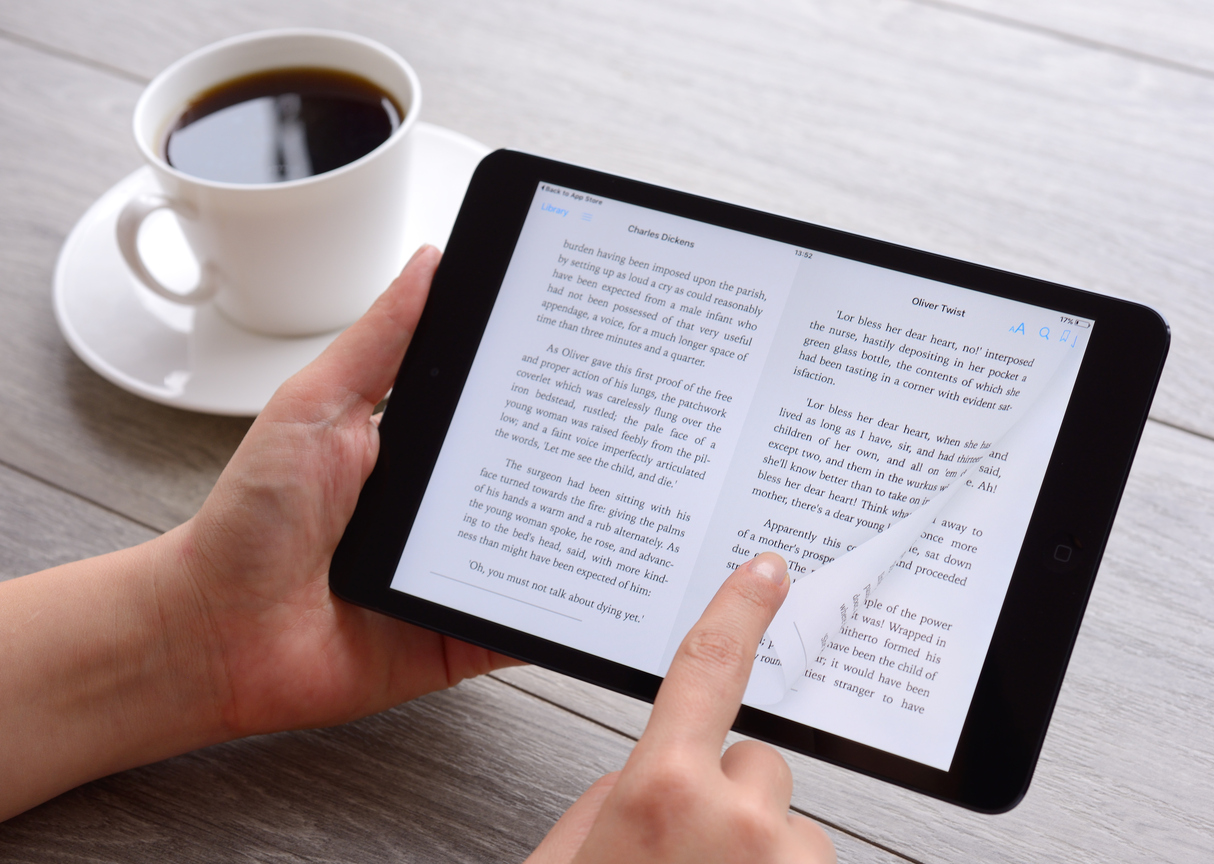E-readers have been the talk of the town for a few years now, from the dowdy but effective Kindle to the gorgeous but flinty iPad. The rates of adoption of these devices and the marketshare they’ve laid claim to have been surprising, and indicate that the e-reader is here to stay.

But is e-reading coming at a price in productivity? Do we lose time when reading electronically, even on devices made for reading?
The iPad measured at 6.2% lower reading speed than the printed book, whereas the Kindle measured at 10.7% slower than print. However, the difference between the two devices was not statistically significant because of the data’s fairly high variability.
Hallelujah, the printers shout! Finally, proof that good old paper trumps these newfangled electronic reading devices. It’s faster, after all. That’s got to be of huge significance in a world looking for more productivity from its people.
Um, two things before you pop the bubbly . . .
First, note the internal caution Nielsen puts on the findings — not statistically significant. Why? Because of the data’s “fairly high variability.”
But more importantly, reading quickly isn’t the same as usability. And this is a crucial difference, it turns out.
Devices like the iPad and the Kindle are usable for many different things. A Kindle can be used to read newspapers, books, blogs, and personal documents. An iPad can be used to browse the Web, read email, and many other things.
A book, meanwhile, can really only be used for reading and personal note-taking. Most importantly, a book can only be used for reading the book that’s printed on its pages. This is a vital limitation to books which devastates their usability.
Tony Bradley makes this point well in a post at MacWorld, in which he begins:
While the study seems to suggest that tablet reading devices are inferior to printed books for consuming the written word, it does not account for the convenience and overall higher reading volume made possible by devices like the iPad.
Carrying an iPad or Kindle, I can read many things in many formats, all on the same device. I may read marginally more slowly for extended passages, but I’ll probably do more reading overall on one of these devices, especially if I’m traveling, busy, or shifting settings. Having recently spent a vacation outside the US, the Kindle’s international delivery of books allowed me to purchase two new books while traveling — books I never would have found locally. I read more because of this. I could acquire these books without adding to my luggage. I paid less than for physical books. Does the fact upset me that, on average, I might read 100 e-pages while you read 110 in print? Good luck keeping up with me if I’m reading while you’re out shopping in a foreign country for an English-language book — or waiting for your printed book to ship.
Reading speed is different than productivity.
And Nielsen’s study begs the question, Is slower reading such a bad thing? Is skidding across the words what we want to do? Is speed-reading really the goal of reading extended passages?
A friend of mine years ago insisted that he didn’t proceed beyond a sentence until he was sure he understood it. He read slowly, savoring each idea. And he was awfully smart. When I’m in a particularly dense book, I think of him, and I slow down.
Is reading really something we want to turn into a hot-dog eating contest?
I think not.
So, while the study has some limited interest, let’s remember that the goal isn’t the number of words consumed, but the quality of the ideas transmitted and the fidelity with which they’re received.
Discussion
11 Thoughts on "Measuring Reading Speed on E-Readers Teaches Us That Speed Isn’t Usability"
I think it’s an interesting study for a few reasons. First, I’m assuming the slower reading speeds are due to the lower resolution of the screens versus ink on paper. It will be worth watching to see if the speeds change when Apple’s new display technology reaches the iPad.
Second, one often hears about how the Kindle is a superior reading experience to the iPad. In one aspect apparently, speed, the iPad tops the Kindle.
Also of note, Kevin Kelly has an interesting article about the differences between reading on paper and on a screen, how one inspires contemplation where the other inspires action. Worth a read, though I disagree with his vision of a future where we’re constantly broadcasting every aspect of our lives. I think one of the lessons of our current era will be that no one, other than advertisers, really wants to know that much about you.
This was a small study (n=24) so it isn’t surprising that the results were statistically insignificant, and yet there was a consistent pattern: both e-reading devices were inferior to print reading with regard to speed.
What isn’t mentioned in Nielsen’s study is whether the order of reading devices mattered, whether familiarity with the device mattered, or whether inter-subject characteristics made a different (e.g. heavy readers vs. light readers; or readers who spend a lot of time reading from a screen).
I’m not surprised to see a difference, but understanding the cause(s) of that difference is the more important question.
Speaking as an iPad user, I’ve not even thought about the screen resolution when using the Kindle App. It seems fine to me. The iBooks app is a bit more shiny, but I’m not certain it makes a huge amount of difference. I’ve not had one issue with the reading experience on the iPad.
Referring back to some posts here and elsewhere that have discussed the nature of “good enough”, one would have to conclude that if this test says anything, it says that the iPad has passed the minimum criteria for a serious reading device with ease. Then it goes on to offer so much more in functionality that the comparison becomes no longer valid.
Of more interest to me than the reading speed was the user reported satisfaction rating. The iPad scored the highest of all mediums, followed closely by the Kindle, and paper. The PC was a distant 4th.
Given the sample size, the difference in satisfaction ratings between the iPad, Kindle, and paper are not statistically significant. But what is significant is that users rate the iPad and Kindle at least as satisfactory a reading experience as paper – and possibly slightly better. Now one could ask what “satisfaction” means (and Mick Jagger has, of course, raised this issue before).
Does it mean that users like the iPad/Kindle better than paper because they can do more things with it? Did the devices get a bit of a novelty bump (I mean paper is SO 2nd Century)? Regardless, people (at least 24 of them) seem to like their tablets.
Not so much the PC. People who think that the PC is just fine for long form reading might want to look hard at Nielsen’s study. I’m already imagining the Apple ad with John Hodgman (“I’m a PC”) trying to read the latest Stieg Larsson novel on a giant computer set on his nightstand.
I wonder about the sample that was used, as I haven’t seen the study itself. In my own experience, both as a reader and as a bookseller, the added time isn’t in the resolution of the page, but rather the delay in page turning. Although this has improved greatly, especially on the I-pad, my own experience and that of many I’ve talked to is that there is still a bit of a hesitation which in turn leads to a break in concentration. While this has little or no effect when reading brief articles such as you might find in a newpaper or magazine it gets very frustrating when reading for pleasure, as with a novel, or reading more technical material, such as a textbook. In fact, we’ve had people come in to the store and buy a hard copy of a book they started reading on their e-reader because they found the interruption of page turning to be just too frustrating.
As far as screens are concerned, I find the I-pad much better than the Kindle, and it has color too! The question there, of course, is a more philosophical than practical one, namely, will people relly read on the I-pad when they can with a click or two surf the web, get their emails, watch a video, or play a game? Only time will tell.
Reading more slowly one might also learn that “begs the question” does not mean “raises the question.”
I believe the usage is proper in this case. In “begs the question,” the word “beg” means “to dodge or avoid,” reflecting the notion is that the underlying premise is assumed without proof or challenge. I thought the underlying proposition (that reading faster is better) was being dodged by the study, so in fact, the usage of “begs the question” seemed proper to me in this case.
Of course, your response invites the question, Does anyone care about this fine distinction beyond pedants like us?
“So, while the study has some limited interest, let’s remember that the goal isn’t the number of words consumed, but the quality of the ideas transmitted and the fidelity with which they’re received.”
Your parting shot gets to the heart of the matter. Although this study offers data of some (very) limited interest, it rather misses the point. By testing readers only on the single aspect of speed I would posit that Nielsen has revealed nothing of significance. It seems to me that matters such as retention and satisfaction with the reading experience are far more relevant.
In addition, my personal experience with multiple formats (traditional books, ebooks and audio books) has led me to 1) increase & diversify my consumption of written material, and 2) acquire & consume the books I most value in more than one form. It’s not unusual for me to read a book in hardcopy, buy the ebook so it’s available when I’m mobile, and listen to the audiobook as well (a fresh experience of the work when presented by a top-notch reader).
Digital formats will not replace traditional media, but they will expand the range of access for readers/listeners.
The greatest weakness of traditional publishing lies in their inefficient, resource-wasting distribution system. When POD hits the neighborhood book store (drop in, order your books and sip a latte while they print them), I’ll be the first in line!



